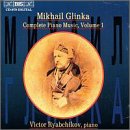| All Artists: Mikhail Glinka, Victor Ryabchikov Title: Glinka: Complete Piano Music, Vol. 1 Members Wishing: 1 Total Copies: 0 Label: Bis Release Date: 11/1/1998 Album Type: Import Genre: Classical Styles: Opera & Classical Vocal, Chamber Music, Historical Periods, Classical (c.1770-1830), Instruments, Strings Number of Discs: 1 SwapaCD Credits: 1 UPC: 789368787920 |
Search - Mikhail Glinka, Victor Ryabchikov :: Glinka: Complete Piano Music, Vol. 1
 | Mikhail Glinka, Victor Ryabchikov Glinka: Complete Piano Music, Vol. 1 Genre: Classical
Glinka found his true voice as a composer only after he began using Russian folk music as his inspiration. He then became the founder of the Russian national school and might have been the first nationalist composer anywhe... more » |
Larger Image |
CD Details
Synopsis
Amazon.com
Glinka found his true voice as a composer only after he began using Russian folk music as his inspiration. He then became the founder of the Russian national school and might have been the first nationalist composer anywhere. Most of this piano music was written before Glinka's great discovery, and despite Victor Ryabchikov's fervent program notes in support of the music, it isn't very significant. Until his great revelation, Glinka wrote talented, entertaining salon music, nothing more. If you're interested enough in the composer to want to hear these mostly early works, though, Ryabchikov is an outstanding advocate, playing with obvious commitment, a wide range of tonal color, and the kind of expression you'd want to hear in Chopin's music. Beautiful recorded sound quality, too. --Leslie Gerber

 Track Listings (14) - Disc #1
Track Listings (14) - Disc #1